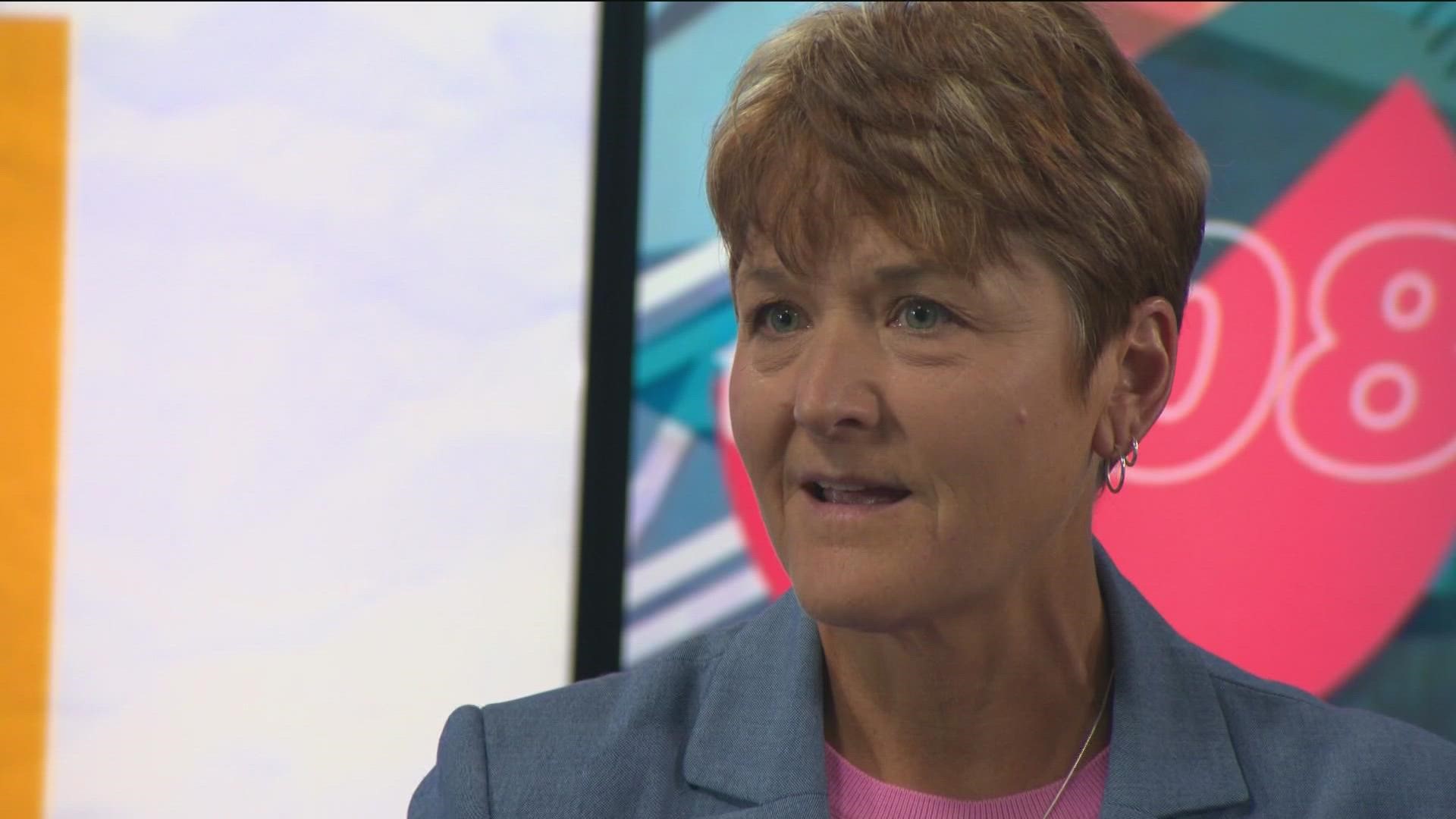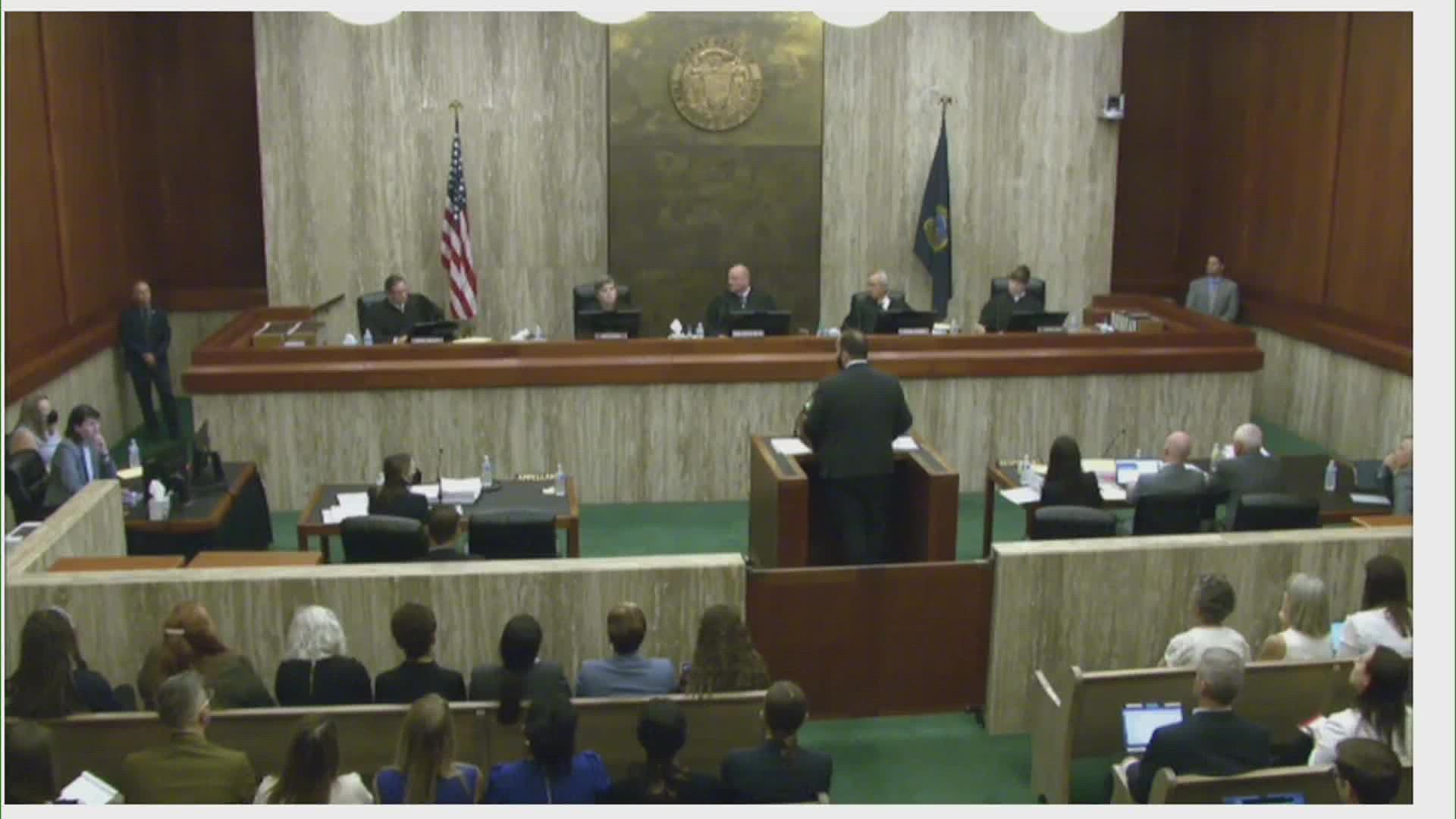BOISE, Idaho — Pausing the trigger law banning most abortions on Aug. 25 is now in the hands of the Idaho Supreme Court, after the justices heard arguments on Wednesday on how to proceed with the two lawsuits Planned Parenthood filed against the State of Idaho.
The court could decide to send the lawsuits to a lower court, consolidate all three lawsuits, or put a stay on the lawsuits while legal proceedings continue to decide if the abortion bans are unconstitutional.
The court heard just the first two lawsuits Planned Parenthood filed against the state, but that still included discussion over the third lawsuit regarding the six-week ban, which criminalizes abortion after six weeks of pregnancy, passed in April 2021.
The six-week ban includes language regarding criminal prosecution that could possibly conflict with the trigger ban, which completely supersedes all other bans in place if it goes into effect Aug. 25.
Justice Robyn Brody brought up the issue of the potential conflict, which additionally could conflict with SB 1309, known as the heartbeat bill, which currently is placed on pause from going into effect. This bill allows for private citizens to sue abortion providers after cardiac activity is detected.
Essentially, the language in the heartbeat bill is unclear, she said. If one was to bring a suit against a provider they would have to rely on the six-week ban to do so. However, that would be impossible, since the six week ban would be superseded by the trigger law.
The six-week ban would go into effect Aug. 19 unless superseded, due to a court in Georgia upholding a similar ban.
"When the dust settles on August 25 and both of these laws go into effect, I don't know how to read that superseding language," she said.
Justice Greg Moeller pointed out the civil lawsuit statute may have just been in place to get around Roe v. Wade before its overturn.
Alan Schoenfield began arguments for the appellants, Planned Parenthood Great Northwest, Hawai'i, Alaska, Indiana, Kentucky. "This statute gives no guidance," Schoenfield said. He told the five justices that the trigger law is too vague to be enforced.
SB 1385, the trigger law, will take effect later this month banning nearly all abortion except when an abortion prevents death or if someone can provide a police report in cases of rape or incest. This law includes that criminal element, making performing an abortion a felony.
Schoenfield told the court on Wednesday that the language in this law is too vague, and gives no indication on "how substantial the risk of death must be" and that "no healthcare provider would subject themselves to criminal penalty."
Essentially, each physician must immediately weigh how close a pregnant person is to death in order to perform an abortion or be thrown in prison if they are wrong, so the risk is too high and the decision is too subjective, Schoenfield argued.
"Must a woman's death be certain?" He asked.
Additionally, he said that higher courts have already upheld issues of familial privacy within the states and that Idahoans have a right to procreate.
"Other states have reached the agreement that their constitutions protect abortion," Schoenfield told the court.
The court considered the notion that they may need expert testimony to talk about what a healthcare provider could or could not perform.
Justice Colleen Zahn brought up the thought that if the court has to weigh more than just the matters of the law, like scientific evidence, the lawsuits should be given to a lower court, to which Schoenfield did not object to.
Moeller said these things typically need medical testimony for courts to decide.
Deputy Attorney General Megan Larrondo, for the State, requested that the court should vacate its original pause on the lawsuit of SB 1309, the heartbeat bill, as well as consolidate the cases and refuse to hear them.
Larrondo said that as far as the issue of vagueness goes, physicians can operate under the scope of "good faith medical judgement" which in her opinion, sets the standard for them to provide abortions under the law, and is not vague at all like Planned Parenthood has said.
"There is also no expressed guarantee to a right to an abortion in the Constitution," Larrondo said. "What did the framers intend? There is no way they were thinking they were enshrining something criminally prohibited as a fundamental right."
Larrondo and the state are asking for the two laws to be implemented without a stay.
A decision from the Idaho Supreme Court on whether or not to stay the cases, to hand them to a lower court or to consolidate them could be coming soon.
Alexandra Duggan was at the Idaho Supreme Court to cover the hearing for KTVB. Live updates are posted below, with the most recent update appearing first.
11:07 a.m.: Schoenfeld (for Planned Parenthood) begins rebuttal.
11:05 a.m.: Intervening attorney Monte Stewart (for Idaho Legislature): If the stay is held, it is "perpetuating the Roe-Casey abortion regime" in Idaho.
10:49 a.m.: Larrondo said we have to look at the framers of the Constitution's original intent -- abortion was illegal so there would be "no way" they would enshrine it as a fundamental right.
10:40 a.m.: Larrondo is citing good faith judgment in medical judgment as a reason the law is not vague. "Not every word needs to be defined," she says.
10:39 a.m.: Megan Larrondo, representing the state, is up now for her arguments. She is saying the law is not vague since the option to provide the abortion is up to the discretion of the healthcare provider.
10:29 a.m.: Moeller said there are scientific citations in the petition and that the court cannot weigh that because Schoenfield laid out that this is based on law, not fact of the matter.
10:23 a.m.: Schoenfield said high courts have already identified a right to privacy (and abortion) and in Idaho. Moeller said that abortion was federally identified in the Constitution but not in Idaho, as it has always been illegal before Roe.
10:15 a.m.: Alan Schoenfield is arguing for Planned Parenthood. He begins by saying the law is vague and no one will know how specific or substantive the risk of death must be to provide an abortion.
10:07 a.m.: Justices take their seats on the bench. Chief Justice G. Richard Bevan speaking.
10:05 a.m.: Justices have not yet entered the courtroom.
9:52 a.m.: We are in the courtroom now.
9:16 a.m.: There is also a Planned Parenthood rally planned for 9:30 a.m.
Watch more Idaho politics:
See all of our latest political coverage in our YouTube playlist:


